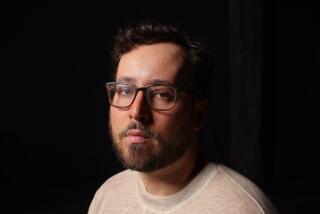STAGE REVIEW : Abercrombie’s Gives ‘Cocteau’ Poetic Justice
- Share via
Ian Abercrombie did not try to look like Jean Cocteau in his one-man impersonation of the French poet, artist, playwright and film maker last weekend. He merely was. When the lights went up at the Gallery Theatre in Barnsdall Park on “Jean Cocteau--Mirror Image,” they revealed Abercrombie in a pose characteristic of the flamboyant man he was portraying: a long scarf stylishly draped over his shoulders and down the back, his hands with palms turned upward.
It was enough.
Cocteau (the centenary of whose birth is being celebrated in a variety of Southland events this year) believed in making an impression, in being his own poem. Anything more suggestive than that slightly dandified pose would have been too much. For another thing, Abercrombie and Cocteau look nothing alike. The latter was slender with a large head made even larger by an unruly shock of frizzy hair, a long, triangular face, hollow cheeks and penetrating eyes. Abercrombie is compact and rounder--a testament to what an actor can do to convey an essence without attempting a reproduction.
Much of the script of “Mirror Image” (written by Crispin Thomas) concentrated on doing the same thing: Giving us an essence rather than a duplication. Abercrombie, his straight and docile hair only lightly ruffled, simply walked around and talked.
He spoke about aspects of Cocteau’s life and art, touching largely on his achievement and his ego (“If they had known that I was going to become Jean Cocteau they might have been more understanding. . . . Already my life was a masterpiece”). Cocteau’s homosexuality was acknowledged (“. . . the spectacle of soldiers bathing . . .” or watching sailors in Toulon), as were his lovers (especially the young novelist Raymond Radiguet), his addictions (opium and language--”I am jealous of the words of other writers, except Flaubert”) and his inspirations (notably Proust, Satie, Stravinsky and Picasso).
While there is nothing especially new in such revelations, the Thomas script imparted it all in short, elegant bursts quite worthy of the eclectic Frenchman, along with some psychological factors that completed the portrait with less widely known biographical detail (his father, “an amateur painter,” shot himself in the head with a pistol and “Auguste, my mother’s valet, became the head of the household. . . .”).
Thomas/Abercrombie also allowed for small personal manifestos, dropped casually, here and there, between other events: the battle (as Cocteau saw it) between “sex and creativity”; art as “the love-making of self and self”--and a credo or two. “I love mankind,” he announced. “I love love; I hate hate. . . . If I disapprove of a work, I try to find something in it that will make me change my mind.” (Among his many accomplishments--some people say too many--Cocteau clearly should also have become a critic.)
This canny, elliptical style, that gives you enough without crowding the canvas, was also picked up by the director, Robert Robinson, who, on a carefully uncluttered stage dominated by an opium pipe, allowed Abercrombie to physically do less, trusting in our ability to fill in the blanks, which at once made it possible for us to hear more.
After the gyrations of last week’s program of performing artists all working too hard at giving us something “in the spirit of” Jean Cocteau, the clarity, restraint, simplicity and pleasure of the man himself--or a persuasive facsimile--were a tremendous relief.
More to Read
The biggest entertainment stories
Get our big stories about Hollywood, film, television, music, arts, culture and more right in your inbox as soon as they publish.
You may occasionally receive promotional content from the Los Angeles Times.









